Marital Property Division in a California Divorce
Table of Contents
Toggle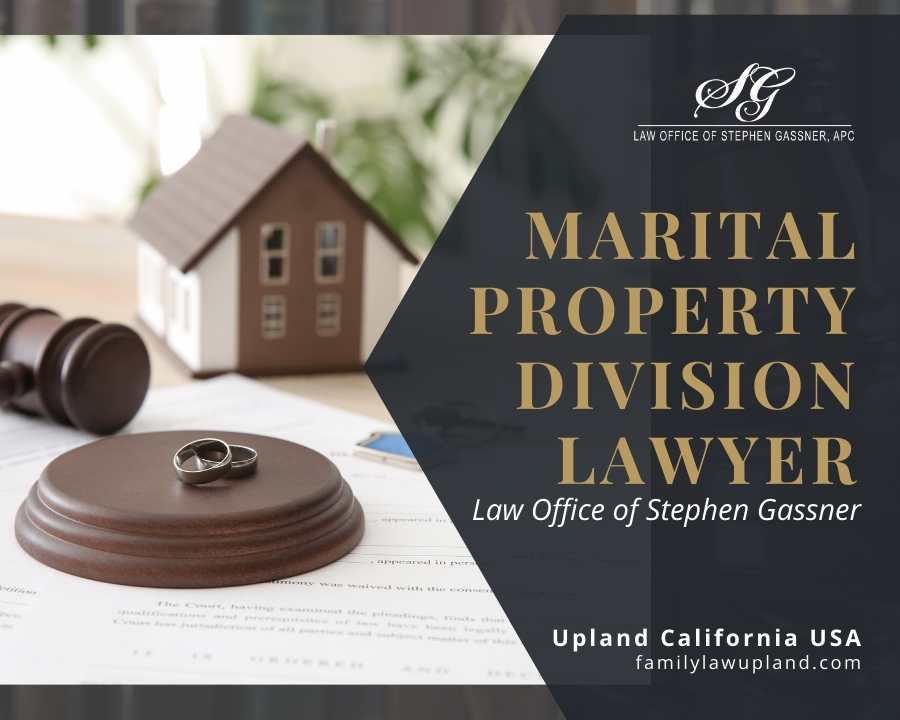
Divorce may be a tough and emotional process, particularly when splitting property earned during the marriage. Community property rules govern the division of marital property in California, which implies that each spouse is entitled to an equal part of the assets and obligations accumulated during the marriage. Yet, establishing what constitutes marital property and how it should be divided can be complicated, and understanding the legal structure and procedures involved is critical. This article will provide you with an overview of marital property distribution in a California divorce to help you understand the rules and processes around property division so you can navigate this difficult time with better clarity and confidence. Marital Property Division Lawyer Upland CA
If you are going through a divorce in California, your lawyer may need to help you with the division of your property. The process can be difficult, but if you have the right attorney with The Law Office of Stephen Gassner to guide you through it, you will be able to make the most of your assets and debts. Marital Property Division Lawyer Upland CA
Definition of Community Property
If you’re a divorcing couple in California, most of the property you earn or buy during your marriage will be considered community property. This includes both financial assets and debts.
As a result, it’s important to know what is considered separate property in California and how you can protect your own interests in a divorce. To make sure your rights are protected, you should talk to a lawyer who knows about California’s community property laws.
The main difference between separate and community property is that anything acquired during a marriage is assumed to be community property unless the person claiming a separate property interest can prove that the asset came from a separate property source. Collecting and organizing documentation is crucial. Assets and debts acquired before the marriage or after the date of separation may be deemed separate property. Separate property assets that are used to acquire an interest in community property (such as a downpayment to a community property) can usually be reimbursed to the contributing spouse.
We have the skills to get you your fair share of the things you earned or bought while you were married. This could include everything from real estate to savings accounts and retirement accounts. Unfortunately (or fortunately), the debts also get divided. Marital Property Division Lawyer Upland CA
However, the presumption of community property can be rebutted when one spouse claims that the property is theirs alone. This is especially true if the property was titled in one spouse’s name only, or acquired from a separate property source. Marital Property Division Lawyer Upland CA
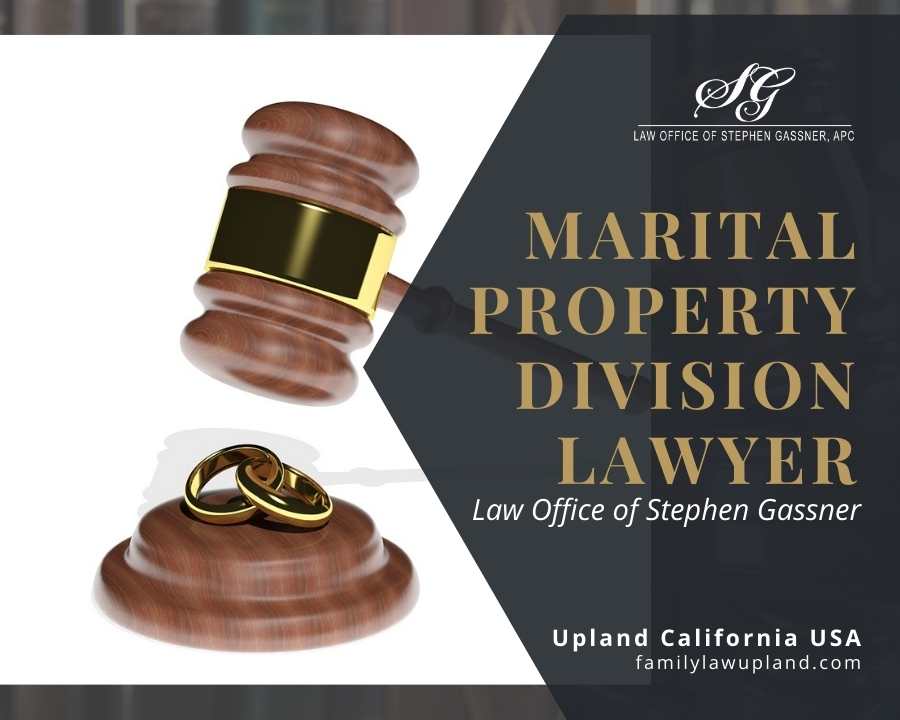
Definition of Separate Property
Assets and liabilities acquired prior to the date of separation are separate property. But only if the appropriate documentation can be located and organized. Assets and liabilities acquired by gift, inheritance, or from sources of separate property are also considered separate property. Separate property can include contributions to the acquisition of a community property asset, such as a bank account, a home, a business, or virtually any other type of asset that has tangible value upon the dissolution of the marriage.
Separate property can include contributions to the acquisition of a community property asset, such as a bank account, a home, a business, or virtually any other type of asset that has tangible value upon the dissolution of the marriage.
Whether a spouse’s separate property becomes community property during the marriage, or when community property becomes separate property during the marriage, is a common issue in divorce cases. That can happen if you cannot distinguish which part of an asset or debt is separate or community property.
When and how an asset was acquired, the source of funds used to acquire or improve it, and actions taken by either spouse that affect its nature can all affect whether the asset is classified as separate or community.
Typically, real estate acquired prior to the marriage is considered separate property. However, a person may also own gifts received during the marriage, such as jewelry or other personal property.
Gifts from one spouse to the other are separate property unless the value of the gift is significant in light of the other assets and debts being divided. For instance, in some divorces, the gift of a car might not really be separate property, particularly if the care is the most valuable asset acquired during the marriage. But if the car is only a fraction of the assets acquired during the marriage, a court might presume that it is the separate property of the spouse who owned it on the date of separation.
Typically, a family home that was acquired before marriage is separate property, though the community estate might acquire a portion of its value if community property is used to pay the mortgage or improve the property.
There can be arguments on both sides regarding the intention of the person that are received are separate property – though there can be exceptions.
How an item was acquired before marriage determines whether it is separate property. For instance, if you wrote a hit song before your wedding, royalties are considered separate property (even if the royalties were acquired during the marriage).
Occasionally, a separate property asset, such as a business, can increase in value as a result of community contributions (such as a spouse’s labor) made during the marriage. In such circumstances, the separate property asset may be required to reimburse the other spouse, despite the fact that the remainder of the business interest may be separate property.
One must be careful when deciding to claim a separate property or community property interest in a business, to decide whether the business is really a business or a job. Some businesses are merely jobs, without any community property interest to divide. Marital Property Division Lawyer Upland CA
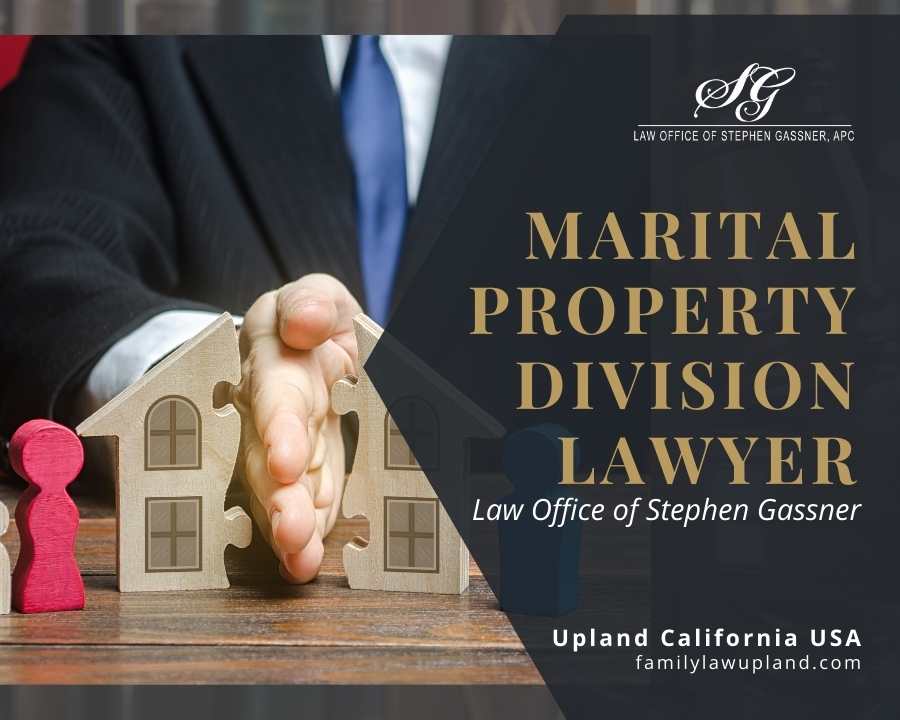
How to retrieve your separate property
Marital property is all the money, assets, and debts that either spouse acquired during the marriage unless both spouses have agreed to separate these items in a prenuptial or postnuptial agreement. In California, marital property is divided equally or equitably.
Reimbursements are reimbursements a spouse is entitled to receive in the event of divorce from other spouses for the funds they contributed to a particular asset. This could include a home that one spouse acquired before the marriage but added their new spouse to the title via a quitclaim deed.
The majority of courts have held that, as construed, Family Code section 2640 permits a contributing spouse to seek reimbursement for their separate property contributions not only from the property to which they contributed their funds but also from any other assets they may acquire after the contribution, provided there are funds traceable to the original contribution. This interpretation promotes the basic legislative purpose of Family Code section 2640 to encourage spouses to freely contribute their separate assets to the community, knowing they will be reimbursed if their marriage ends in dissolution.
Negotiated settlements
A frequent way for parties to settle their divorce is through a negotiation process called mediation. During the mediation process, both parties and their attorneys meet together regularly to discuss and review issues. They may also hire other professionals, like child custody specialists or accountants, to help with the settlement negotiations.
The mediator takes information from both sides and attempts to help the parties find common ground. Parties who are getting a divorce can decide, themselves, to come to us to prepare a judgment based on their agreements. Or a spouse could be represented by us when we go visit the mediator with the other spouse (and possibly their attorney).
Often, mediation is cheaper than going to court. In other cases, mediation is more expensive than just going in front of the judge. The amount of money (or assets) to be divided can be a deciding factor, or the amount of controversy between spouses may make it cheaper to go to court. Many times, there are desired outcomes that can occur in mediation that the court could not legally provide without an agreement.
Sometimes there are situations where one spouse wants to receive more, and the other spouse wants to pay less. These cases often cannot be resolved by mediation. But good attorneys can often share the evidence and recommend the same sort of outcome that a judge would provide if the matter were litigated. In such cases, it is best for both spouses to listen carefully to their attorneys.
As a general rule, most courts want to know that both parties have attempted to negotiate a resolution prior to trial. This is important because it shows that the parties are willing to take reasonable steps toward reaching a solution. It is also required by the Rules of Court.
Another important factor to consider during negotiations is that a divorce requires spouses to reassess their personal goals and needs. This can lead to a shift in how they think about their short- and long-term finances, which can influence the proposed property settlement.
If you and your spouse are entering negotiations with a clear and firm list of demands, this may be a stumbling block that can cause both sides to give up on the negotiation process or stall in court. For mediation to work best, it is necessary to enter into the process with an open mind as to winning some things and losing others.
Community Property Business Interest
If you are a business owner or your spouse owns a business, it is important that you work with an experienced California divorce attorney to properly divide your assets in a way that is fair for everyone involved. Our litigation team s has a lot of experience figuring out how to divide property in a wide range of complicated divorces.
For example, let’s say that you and your spouse own a community property business. A business is often the single largest asset in a divorce, and therefore it is of the utmost importance to properly value, either divide and liquidate your business interests during the property division process, or otherwise to decide to whom it will be awarded, and what valuation and cashflow to ascribe to it. These assessments may be used to determine whether the spouse who operates the business may be awarded the business and required to compensate the other spouse for the community interest, or whether it might be better to consider the cashflow of the business when deciding (or agreeing upon) spousal support and/or child support.
Business income is the income available to pay support, even if neither party knows precisely what the income is, at the beginning of the divorce/at the outset, what it is. Often in these situations, we require the services of a business valuation specialist to study the records to come up with both assessments (valuation and cash flow).
A court may decide that a business is community property if the increase in its value during a marriage is directly related to the efforts of the business owner. This means that if a business owner spends several months improving a structure, it is possible that the increased value of the improvement services is community property and will be distributed among both spouses in the event of a divorce.
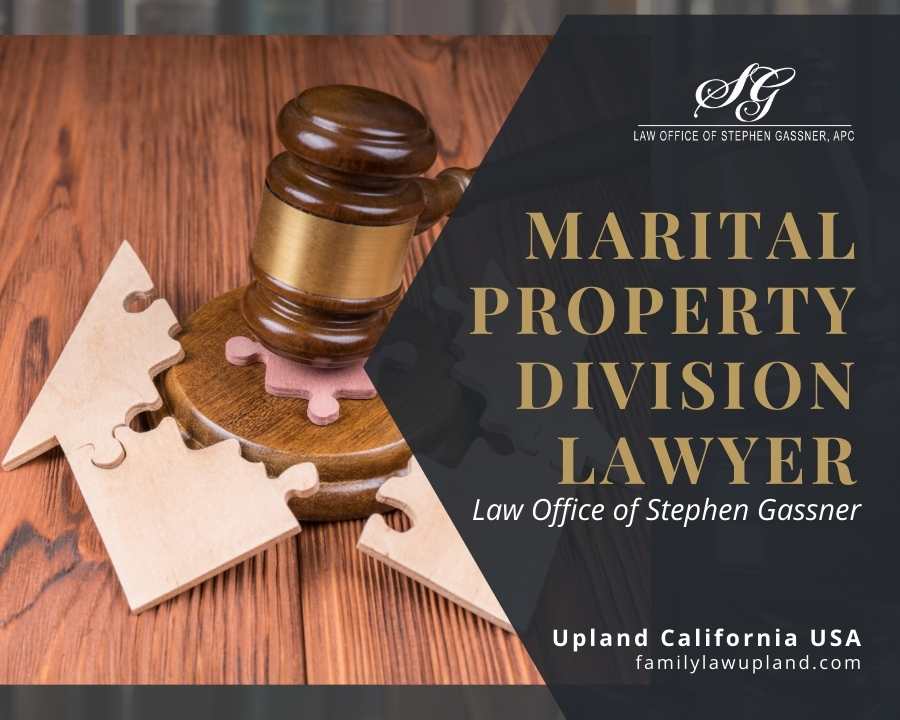
Pension benefits earned during a marriage
If you and your spouse have a pension, it’s important to know how this asset may be divided in a divorce. Generally, most pensions are considered joint marital property, at least in part. This means that the part earned while the couple was married has to be split 50/50, which may not happen until the pension participant’s spouse retires. In such instances, it is necessary to prepare and submit special orders that divide the community and separate interests in the pension plans.
In some cases, it is possible and necessary to establish the value of a pension plan. This is a difficult problem because it requires calculating the value of each future payment until the person who qualifies dies. Add up the current value of each future payment, discounted to the present, and discounted further by the likelihood that the person will reach that age, and you have quite a problem to solve. Luckily, there are specialists called actuaries, who can readily evaluate the net present value of a pension so that it can be traded against any other asset.
The exact percentage of a pension that is yours will depend on how much of the funds were earned during the marriage. If you have a prenuptial agreement that protects your pension, it may still be yours even if the marriage ends.
If you’re considering filing for divorce, you should get legal advice from a California family law attorney. You should also check with a financial advisor to understand how the division of retirement funds will affect your situation.
Breach of Fiduciary Duty
In California, each spouse has a duty to act in good faith and treat the other with fairness. Fiduciaries, like business partners, estate planners, and trust officers, are required by law to do what is best for the people they work for. If these individuals fail to do so, they can be held liable through a breach of fiduciary duty lawsuit.
To bring a breach of fiduciary duty claim, you need to demonstrate that there was a special relationship of trust between you and the person who violated your interests. Examples of this are relationships with an employee and employer, a client and attorney, a trustee and beneficiary, or between spouses.
You also need to show that the person who violated your interests harmed you. If you can prove this, you can get real and fair damages from the fiduciary who didn’t do what they were supposed to. An example is when one spouse fails to make a full disclosure of community property in their possession during the divorce.
If you believe that your has broken their fiduciary duty to you, then it is important to hire an experienced attorney who can help you establish your case. A breach of fiduciary duty can entitle the non-offending party to receive attorneys’ fees, and, in the instance of a great breach made in bad faith, both the amount of their own half-interest in the property, plus the offending party’s half-interest in the property (both-halves).
By the same token, if you are accused of breaching your fiduciary duties toward your spouse, seldom is all lost. Frequently, it is not difficult to avoid major damage even after you have been caught.
Learn More About: Men’s Divorce By Law Office of Stephen Gassner
Men’s Divorce
Frequently Asked Questions
-
Is Everything Split 50/50 In A Divorce In California?
Yes, by default, everything is split 50/50 in a divorce in California because they abide by the community property rules. That does not mean, however, that the parties are subject to those rules. Before getting married, the parties might execute a prenuptial agreement that specifies which properties and income belong to which party. -
What Is A Spouse Entitled To In A Divorce In California?
In California, a wife may be entitled to up to half of the marital assets as well as up to forty percent of their partner’s earnings for child support, spousal support, and primary child custody. -
Who Gets The House In A Divorce California?
In almost all circumstances, under California’s community property laws, both spouses own the house. If the residence was purchased or acquired during the marriage, both parties have an ownership stake in it, even if just one of them worked and paid for the house.
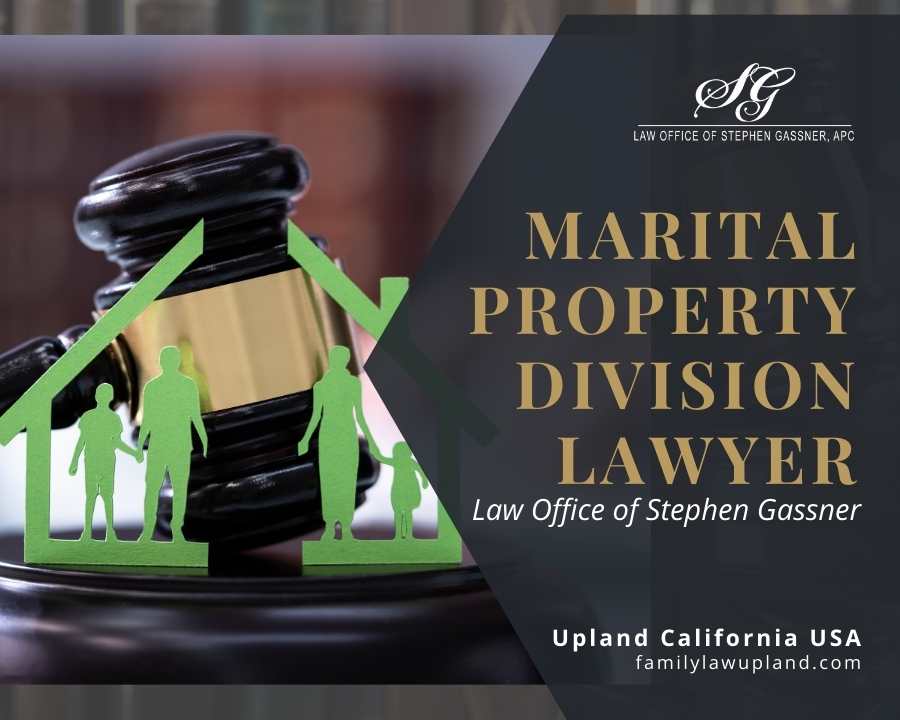
Trusted Divorce Attorney in California
At The Law Office of Stephen Gassner, we are committed to providing the best quality of service and assistance to our clients. We understand that divorce may be a stressful and daunting time, and we are committed to making the process as straightforward for our clients as possible. We take pleasure in being approachable, responsive, and transparent throughout the legal process. We will constantly keep you informed and up-to-date on the status of your case. Marital Property Division Lawyer
Looking for a Family Law Attorney in California, USA? Look no further the Law Office of Stephen Gassner can help you with different family law issues, including divorce, property division, paternity, child custody and support, spousal support, visitation rights, and property division including the complex division of business property. We serve in the following areas of California, USA.
Family Law in Chino Hills, CA
Family Law Claremont, CA
Family Law in Eastvale, CA
Family Law in Fontana, CA
Family Law in Ontario, CA
Family Law in Rancho Cucamonga, CA
Family Law in Upland, CA
Book a Marital Property Division Lawyer Consultation With The Law Office of Stephen Gassner!
Or contact the Law Office of Stephen Gassner
At (909) 937-7000 Now!
324 N Mountain Ave, Upland, CA 91786, United States
(909) 937-7000
